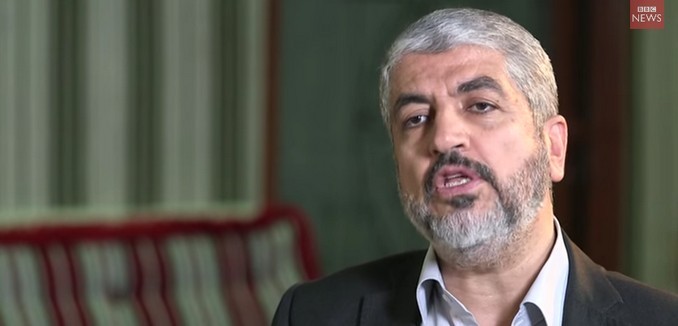Hamas leader Khaled Meshaal has left the Gulf state of Qatar, which had been his home since 2012, and has moved to Turkey, according to a report published Monday in The Christian Science Monitor. Meshaal’s departure is reportedly the result of the growing influence of the rapprochement between Qatar and both Egypt and Saudi Arabia.
Hamas political leader Khaled Meshal, arguably Qatar’s most famous resident, has left Doha, his departure marking a deeper geopolitical shift taking hold in the region. …
The main force at play in the region is a strengthening of an Egyptian-Saudi axis that is increasingly hostile to Islamists, particularly the Muslim Brotherhood, of which Hamas is the Palestinian chapter.
The growing ties between Qatar and its neighbor Saudi Arabia may be opportunistic, as the Monitor quotes one observer saying, “Right now the wind of change is blowing in Saudi Arabia’s favor, and Qatar is moving with it.”
Meshaal has not specified how long he intends to stay in Turkey but Hamas official praised Turkey’s “open political atmosphere.”
An article earlier this week in The New York Times explained that the growing influence of Saudi Arabia and its push against Islamists is a result of the instability borne by the so-called Arab Spring. One analyst quoted by the Times observed that “if the region is most in need of stability, effective governance and resources — all of which Saudi Arabia has — then it makes sense that it would play a leadership role, whatever the characteristics of its political system.”
When reports emerged in late December that Meshaal had been forced out of Qatar, Hamas denied them. Even then, the strengthening ties between Qatar and Egypt were said to “frustrate” Hamas.
The reported move of Meshaal and other Hamas leaders to Turkey highlighted the trend of Turkey’s growing radicalization. Even before Meshaal left Qatar, Turkey hosted a large contingent of Hamas officials.
In Where the Shadiest Players Find a Home, which was published in the September 2014 issue of The Tower Magazine, Jonathan Schanzer observed:
But Turkey’s support for Hamas remains strong. Just how strong? We don’t know. In December 2011, Palestinian news sources reported that Turkish President Recep Tayyip Erdoğan “instructed the Ministry of Finance to allocate $300 million to be sent to Hamas’ government in Gaza.” Both Turkey and Hamas denied this, but Reuters and Haaretz published subsequent reports citing this number. …
Then there is the presence of the aforementioned Saleh al-Arouri. The Israeli news website Ynet reported last year that Arouri “operates out of Turkey, with the backing of the Turkish government.” …
Arouri is also believed to be in charge of Hamas’ operations in the West Bank. In January, a senior Israeli military official confirmed this when he told Israel Hayom that Hamas’ recent West Bank operations are “directed from Gaza via Turkey.” More recently, in August, the Israelis announced that Arouri was at the center of a plot to bring down the Palestinian Authority government of Mahmoud Abbas in the West Bank. Arouri recruited the leader of the operation, according to reports. …
Arouri is not the only Hamas figure in Turkey. In 2011, Israel released 10 Hamas operatives to Turkey as part of the prisoner exchange deal with Hamas that secured the release of kidnapped Israel Defense Forces soldier Gilad Shalit. Among the Hamas figures believed to have gone to Turkey include Mahmoud Attoun and Taysir Suleiman. Both were sentenced to life terms in Israeli prison for murder. Both men today appear on television and lecture about the merits of Hamas in Turkey and around the Arab world.
[Photo: BBC News / YouTube ]




